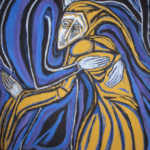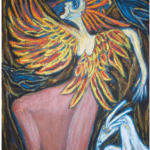Featured, photograph- Princess Diana at a health centre, shaking hands with a patient with HIV/Aids, 1987, London.
It is not easy to touch on the meaning and significance of the life of a person, twenty five years after the death of that person. But given such an awareness might apply at any time, if tasked with such an attempt, the day of the twenty fifth anniversary of the passing of Princess Diana, seems an appropriate, but poignant, point to do so.
Diana Spencer was not born a Princess, but she was born a Lady. If ever the cliche of a woman being a lady were more appropriate, it would be hard to think of. Diana Spencer made “lady like,” mean far more than the cliche, or the charisma, she had innately, way more than the stereotype, or the hype, might add unnecessarily. With some things, you’ve either got it or you haven’t. Of Diana, when it comes to that extra something than no amount of the notoriety of celebrity can conjur up or create, most of us got it, that she had it!
An in many ways remarkable mixture of genuine modesty and developed tenacity, meant that though from the outset of her emerging on the world stage, her appeal was obvious, her qualities special, with her, “what you see is what you get,” was only partly true, and as a promise, was not one kept. For within the wholesome, likeability, the winsome, vulnerability, was so much more. There was a promise of that more to come, whether she made that promise to us or not.
I say “us,” for to any of us who cared, whether slightly or greatly, any of “us,” who lived through and beyond that era, felt it. If, like me, you were a few years younger than the nineteen year old young woman who appeared centre stage on the world stage, in my case a young adolescant, British, at school in London, you noticed her, you felt you knew her, you wanted to know her. And you knew it was true of many so many more miles away!
The “Diana touch” I would describe it as, whatever you might call it, was the combination of style and substance, that no amount of contrivance can or could create. It is interesting that her then husband, Prince Charles, the Prince of Wales, wrote to Lord Attenborough, the great actor, director, Richard Attenborough, who he and Diana knew from charitable circles, to consult with him, about how Diana could improve as a public speaker. It is unsurprising that Attenborough not only met with but assisted, Princess Diana, with the task of speaking in public. But modesty, shyness, lack of experience, lack of confidence, none of them, are permanent barriers to appearing in public, and communicating with the public. As with the bravey of the person who is scared, but goes into battle, he or she is not more of a coward, but less, in fact, is no kind of a coward in any way. Of course to enter the public arena is not to enter the battlefield, but it is a trial by ordeal for some.
But it was the personal touch, that needed not one lesson, nor any help, that gave Diana, the person, the gift that she in turn, gave others. Warmth is not a heat source you can turn on and off at will. Consideration is not something trivial you can fake. We can see through the phonies sometimes, or be taken in by them even from a distance. Or we can sense their unease, not in the public grand gesture, but of the intimate moment. Princess Diana was never, it would seem, particularly loud. And it was in the quietest of contexts, she emerged the most.
Sometimes occasions, were lighthearted and fun. Like the time she first danced when first famous, with her husband at a ball. Or the many handshakes at the inumerable galas or banquets. The media liked to talk about, write about, often or only, how she looked. But if you had a closer look, it was as evident that the excitement was in who she was. And that was not just skin deep.
The nineteen eighties was an era of excess. It was true to varying degrees from lesser to greater, culturally, socially, economically, politically. Dynasty, Dallas, Margaret Thatcher, Ronald Reagan, Trump Towers, Ferdinand and Isabella Marcos, these were not subtle points of reference or people in power! This was the age of winners and losers. The winners partied, the losers didn’t even get invited.
The nineteen eighties was also the era of HIV/AIDS. The threat, real and definite, was felt widely. Indeed, when it first emerged, even a teenage boy like me, then, wondered what had hit us, and what an age to be coming of age! But to those most effected, the LGBT comunity of that era, for them, it was worse than tragedy. It was stigma, whispering, fear, questioning. This was the era in which the UK Thatcher government, did some real good with a very brutal and powerful, efective and prevalent, public informational campaign about the disease. It was also the era in which the same government did harm, with their infamous Section 28, law, banning, outlawing, the “promotion,” of homosexuality, in schools or other places of education, run by local councils . The effect was both cruel and absurd, as it targeted the very group or individuals who needed real freedom of expression, to alleviate imediate levels of concern. It had the effect of silencing the search for acceptance or understanding of any who were young and gay. Those of us who were not gay knew it, if we were politically aware and personally in touch with reality.
Princess Diana was in touch. This was both metaphorical and literal. For some while, the fear of the disease was also caused by ignorance about it. Many feared or felt, understandably, but wrongly, it could be caught by any contact. In the era of COVID we can relate to that, for many diseases are very widely spread because they are very easily caught. In April 1987, on a visit to a health centre, Princess Diana, sat with and talked to patients with HIV/Aids. And she shook their hands. Just as the irresponsible thing to do because of COVID, was to break the distancing and the shaking of hands, the responsible thing, to keep a distance, not shake hands, so the reverse was true of HIV/Aids. Diana, Princess of Wales, “Lady Di,” to much of the world, in one and more gestures, broke a barrier and a taboo, and began to become what she said later, she would like to be, if not actual Queen, “Queen of people’s hearts.”
There is no hyperbloe here. This was a time when for some time, President Reagan could not even mention the disease, and when his government was slow to involve itself in its eradication. It was a crisis in need of champions. Elizabeth Taylor stepped up to the plate. Elton John was there throughout. And Princess Diana was right at the centre of things. The camera was on her. The focus was clear. She made a difference. It was an approach she was to continue for another decade. Later it was on the need to internationally ban land mines. Not only did she speak about this cause. She put herself into harm’s way to alert us to it. She spoke with eloquence and belief. She acted with gusto and determination. She was committed and she was brave. She carried out her duties as she lived her relationships, without prejudice.
And then she died.
Some were put off by the extent of the public displays of emotion, after the shocking news of her car crash. Not for they, the many tears or the extensive tributes. They criticised, but they were few. I shall never forget my immediate visit, with my wife, with my mother, father, brother, to St James’s Palace, and to Kensington Gardens, more than once, to lay cards and flowers and walk and reflect. And I cried, but who didn’t?
The legacy of Diana Spencer, the girl who became a Princess but never reigned a Queen, continues. It is found in memories of those who didn’t know her personally. It is in the causes she espoused charitably. It is in the work of her own family. The sons, William and Harry, when they succeed as often, or fail but try, suceed and fail on their own terms. They bulid their own legacy. But they continue the unfulfilled one of another who didn’t get to. They also live the legacy of their mother. She touched them directly more than anyone. But for many of us who were there, in smaller ways, but in significant ones, she touched us, and it is touching to remember her today and afterwards.
Author Profile
- Lorenzo Cherin works as a freelance actor, writer, filmmaker, educator. He is a longstanding member, and In-House Writer and Co-Ordinator, of The Ustinov Prejudice Awareness Forum. In this capacity he also works in association with his partner, Lanechka Fevola, who contributes to projects in development and particularly her original art work, for the the Ustinov Forum.
Latest entries
 UncategorizedDecember 3, 2025Healing Ongoing
UncategorizedDecember 3, 2025Healing Ongoing UncategorizedNovember 16, 2025Transgender Awareness
UncategorizedNovember 16, 2025Transgender Awareness UncategorizedOctober 18, 2025Archbishop Mullally
UncategorizedOctober 18, 2025Archbishop Mullally UncategorizedOctober 14, 2025Trump, Towers?
UncategorizedOctober 14, 2025Trump, Towers?

